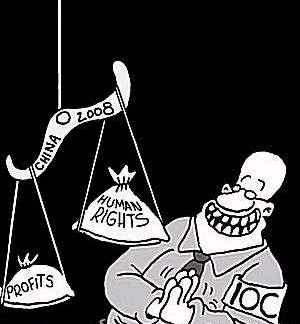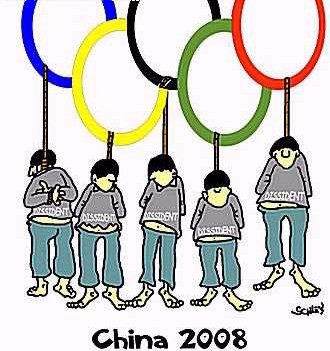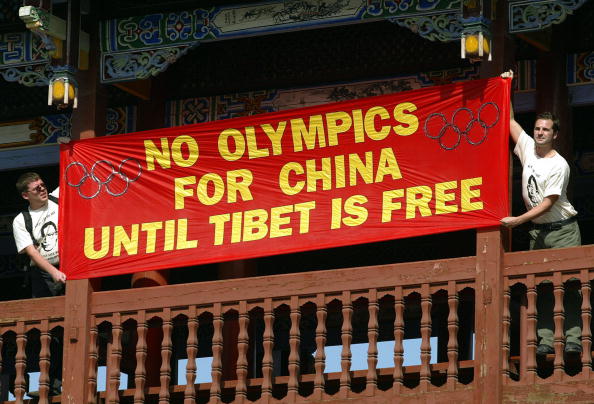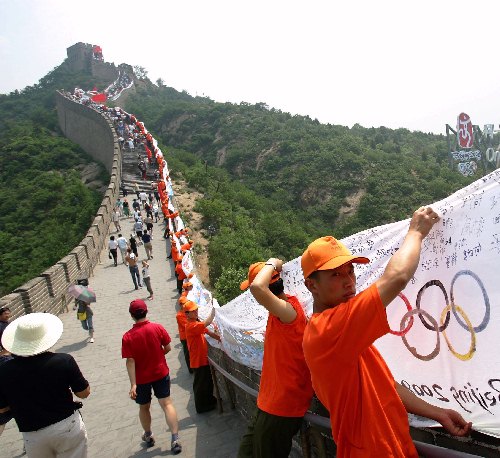|
|
|||||||||||||||||||||||||||||||
|
Olympics Profits and Profiteerism
$PORT$ & PROFIT$By Suzanne MacNevin - 2008. A lot of fuss goes into whether the Olympics are profitable, how they are profitable and the cities fighting over the "honour" of hosting them (and reaping the economic benefit). It used to be that the Olympics wasn't even profitable, and was instead a financial burden (best summed up in the debt incurred during the 1976 Montreal Olympic Games of US $1 billion which took the city of Montreal 20 years to recover from). But during the 1984 Los Angeles Olympics the IOC (and the city) managed to make a profit of $250 million (without borrowing a cent from the government). Since then the Olympics has been mainly a profit-making venture on the part of those applying. They're looking to make as much money off of tourism and sports fans as possible. It is bad enough that we can't have an Olympics without some kind of steroid doping scandal or even bribery of judges for the diving competition. Just stop and think about all the sponsorships, the advertising, the high ticket prices, the price gouging, ticket scalping, etc. The modern Olympics isn't interested in fair play and athleticism. The IOC has shifted their interest to how much money they can make a venture which frankly should be non-profit. But have you seen all the "samples" cities bidding for the Olympics send members of the IOC in order to curry their favour? (cough, cough, bribes!) And now that the Beijing Olympics are almost upon us we get to see a new treat: China forsaking Communism is favour of lavish capitalism and National Pride (which they crudely stamp out revolt in Tibet). The IOC says they don't care about human rights violations, and I believe them. They only care about profits. China's economy is now larger than the United States and with over 1 billion Chinese they can make a lot of profits by catering to China's rich and upper class. Mind you, lets think twice about what the IOC is saying. China has a long history of human rights violations. That means they can massacre people as much as they like and the IOC doesn't care. But if the Olympic Games were held in... Germany, and the Germans suddenly started rounding up Jews and executing them... would the IOC care then? (Please note the 1936 Summer Olympics were held in Germany, which Hitler used to promote NAZI propaganda.) We can only presume that the IOC would suddenly care. It would be an international scandal, despite the fact that Germany already has a "history of human rights violations". So why is China exempt? Are Tibetans no different than Jews? Are they not persecuted for their religious beliefs? And what about our athletes stuck in the middle of this? Is their safety going to be marginalized for the sake of stomping down Tibet and repressing freedom of religion? The Beijing Olympics are expected to turn a profit of about $20 to $30 million US dollars, according to a senior Games organiser, in addition to billions in revenue for the local economy.
Beijing Olympiad: Profit or Loss?Almost everyone thinks that hosting the Olympic Games is profitable, but this is not always the case. In 1984, there was reluctance to rent offices to the Los Angeles Olympic Games organizing committee for fear it could not afford the rent. This was based on the debt incurred in the 1976 Montreal Olympic Games of US $1 billion that took Montreal 20 years to recover, and resulted in the withdrawal of several applicant cities. The specter of economic loss is, therefore, an obstacle to the Olympic Movement. This situation changed with the 1984 Los Angeles Olympics, when Peter Ueberroth, president of the Los Angeles Olympic Organizing Committee (LAOOC), created the "privately run" mode. It enabled him to make a profit of US $250 million without a cent from the government, thus making the Olympic Games a profitable undertaking. The Los Angeles Olympic Games brought hope to other host applicant countries, but the Athens Olympic Games ended in loss after the host country spent 10 billion euros. This understandably makes the next Olympic Games host feel a little uneasy. Athens: Model or Lesson? During the Athens Olympic Games not one advertising billboard could be seen in the city. The greeting slogan chosen by the Athens Olympic Organizing Committee (ATHOC) was "Welcome Home," indicating that it advocated a cultural rather than commercial approach. After more than a century, the Olympic Games came back to its birthplace -- Athens. Commerce inevitably raised its ugly head, and the Greeks did their best to reach a balance between Olympic tradition and commercial benefits. In order to downplay the commercial aspect, ATHOC decided that the government should play the role of host. There have been precedents for such an approach in Olympic history, for instance, in the 1988 government-run Seoul Olympic Games, which generated a record breaking US $300 million. Perhaps it was the organizing committee's intention to depart as far as possible from commerce, despite rising costs, that caused the Athens Olympic Games to end in such drastic economic loss. ATHOC tried to restrict the commercial element of the games by keeping the number of sponsors to a record low. According to tradition, sponsors are permitted to erect billboards in the competing venues, but during the Athens Olympic Games, all that were visible were the Olympic emblem and slogans. Sponsors were not even allowed to advertise outside the competing venues, and before the opening of the Athens Olympic Games, ATHOC ordered the dismantling of more than 10,000 billboards in the city. As far as staging a "heritage"-type non-commercialized Olympic Games, ATHOC's method was sound, but according to Professor Fang Fuqian, chief Beijing 2008 Olympic Games scientist, "Hosting an Olympiad in the original Olympic spirit is politically significant, but from an economic point of view, non-commercialization is disastrous." Says Du Wei, vice-president of the Beijing Olympic Economy Research Institute, "Different countries and cities have different concepts. ‘Non-commercialization and purity' was the Athens 2004 concept. But history is far removed from reality. Nowadays, the Olympic Movement, in addition to advocating the spirits of sports and peace, inevitably enters the commercial arena. The Olympic Movement should not reject commerce, but seek a point of compromise within the scope permitted by the International Olympic Committee." Its indifference to profit notwithstanding, ATHOC found ways of economizing. One example is the transformation of an old airport into a fencing and basketball venue. ATHOC also extended time limits on venue construction in order to retain adequate funds for maintenance. It also encouraged residents of Athens to rent out rooms in their houses to alleviate the shortage of hotel beds and gave them the chance to generate extra income. Beijing: Who Stands to Profit? On September 1, 2003 Jacques Rogge, chairman of the International Olympic Committee, and Liu Qi, chairman of the Organizing Committee of the Beijing Olympic Games, jointly opened a gold lock with a bronze key in the shape of ancient coin, symbolizing the opening of the door of Beijing 2008 Olympic Games to enterprises in various countries. Those with an entrepreneurial bent are always on the look out for opportunities to profit. Upon Beijing's winning the bid to host the Olympic Games, canny enterprises began to move, and to date certain real estate projects have raised their prices by 10 percent through publicizing the Olympic concept. Upon the conclusion of the Athens Olympic Games, a Yangzhou toy manufacturer, who produced 2 million mascots for the Athens Olympic Games, immediately realigned its sights on the 2008 Beijing Olympic Games. This factory is now making preparations to produce mascots such as the monkey king, Chinese dragon, and phoenix, with a view to getting the contract to manufacture Beijing Olympic mascots. The entire point of an enterprise is to make profits. When asked whether the Beijing Olympic Games should be profitable, Kong Li, a student at the Shaanxi Normal University, answers immediately, "Of course, there can be no doubt on that score. As long as it is within the bounds of the law, a healthy profit is an indicator of the success of an Olympic Games meet." There are plenty of people with money-making schemes for the Beijing Olympic Games. One young man says he wants to demonstrate how to make Chinese chopsticks and then sell them on the spot. He says, "Demonstrating my skills will promote Chinese dietary culture, while selling chopsticks makes money, so I can kill two birds with one stone."
What does the government think? The total investment in the 2008 Olympic Games will reach 1.5 trillion yuan, of which government investment will constitute the principal part. When investing such a huge sum, returns should definitely be borne in mind. Upon winning its bid Beijing raised the slogan "Hold the best, most outstanding Olympic Games." Fortunately, reason tempered passion, and in the course of venue construction, Beijing began to revise its construction programs. Apart from the National Stadium "bird's nest" project, almost all other construction concepts have been reconsidered. Hosting a "prudent" Olympic Games is a major guideline within venue construction. It is reported that the construction cost of the "bird's nest" has been reduced from 4.2 billion yuan to 2 billion yuan, and that several billion yuan will be saved from the Olympics "reduction plan." The final blueprint will be decided in May of 2005, having incorporated changes in architectural structure, scale and forms. Main adjustments to the construction plan are: First, while guaranteeing project quality, try to lower construction cost. Second, raise the utilization rate of existing facilities and build temporary rather than permanent venues. Third, postpone the date of completion on some venues, in order to control construction and maintenance costs. The deadline for completion of venue construction has been extended from the end of 2006 to 2007. Beijing has learnt from Athens' methods of cutting costs, but gives equal priority to making a profit. In 1999, Beijing's goal for income from the 2008 Olympic Games was set at US $1.625 billion. Hein Verbruggen, chairman of the Coordination Commission for the 2008 summer Olympic Games of the International Olympic Committee, remarked that, bearing in mind the enthusiasm of sponsors, this is a somewhat conservative projection. He believes that actual income will far exceed this figure. Jacques Rogge, chairman of the International Olympic Committee, said in February 2004 that successful Olympic Games host countries gain handsome commissions from television relays. In 2008, China will earn US $240 million this way, up US $30 million over that generated at the Athens Olympic Games. Of all the trades related to the Olympic Games, the service industry is the most important. Specialists predict that the 2008 Olympic Games will create commercial opportunities worth 3 trillion yuan, half of which apply to the service trade. There is still a gap between Beijing's present situation and the required Olympic Games standard. Training personnel, therefore, is an important task for Beijing. The Games will, in addition, attract more foreign investors who will develop new service trades. This transition from hosting the "best" and "most outstanding" Olympic Games to a "prudent" Olympic Games demonstrates a change in approach, and the down-to-earth attitude of the Chinese people. Liu Qi, chairman of the Organizing Committee of the Beijing Olympic Games, says, "Hosting a prudent Olympics does not mean lowering our standards," and "Adhering to the principle of prudence while constructing fine-quality Olympic venues is not a contradiction in terms." In short, the Chinese people intend to maximize on their grand investment. Olympic Games Profits Since 1984 1984: Los Angeles Olympic Games made profits of US $250 million. 1988: Seoul Olympic Games made profits of US $300 million, a record high for a government-run Olympiad. 1992: Barcelona Olympic Games made profits of US $5 million. 1996: Atlanta Olympic Games made profits of US $10 million. 2000: Sydney Olympic Games Organizing Committee generated an income of US $1.756 billion. 2004: Athens Olympic Games ended in a loss.
|
|
||||||||||||||||||||||||||||||
|
Website Design + SEO by designSEO.ca ~ Owned + Edited by Suzanne MacNevin | |||||||||||||||||||||||||||||||



